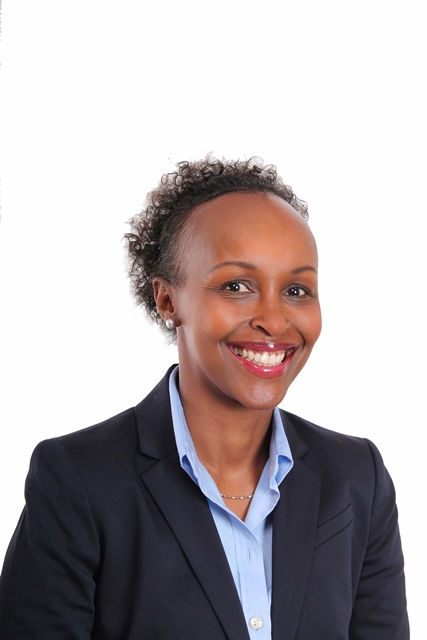In the midst of struggles to close gender gaps by 2030 and the clamour for one voice by women across regions, women have been encouraged to fight their fears and speak up when faced with challenges and inhuman situations such as domestic violence, rape, and marginalization.
According to statistics by Medlineplus, in every 20 seconds, another woman becomes a victim of domestic violence. Many women have lost hope as to the efficacy of judgment houses towards the plight of women. This has however brought about the sprouting of a number of women groups who take it upon themselves to fight for the cause of women’s right.
In an exclusive interview with Amazons Watch Magazine, Ms Mary Chege, an astute lawyer and principal at EMSI & Associates Kenya, shares some reasons why women are faced with these challenges, some of the processes of the law, as well as life experiences which women across regions can learn from. Excerpt:
In a few sentences, please describe the person of Ms MARY CHEGE.
This is always a difficult question as Mary is always evolving and therefore the answer will always change depending on the season in my life. Today, I would best describe myself as a woman in her early forty’s who is curious about Life and keen to learn as much as I can on any given day while having a good laugh at Life. To be honest, I am as curious about myself as I am about everything around me. I am a lawyer so I ask a lot of (sometimes annoying) questions. I am a mother of two girls and aunty to one niece and therefore keen to understand what they’re going through and experiencing – which means more questions. I am a sister to two sisters (one through marriage) and two brothers and we are very close, which means we are in each other’s business – finding out what is happening in each of our lives and how we are doing. I like to think of myself as an artist even though I have not painted anything in many years and I love beautiful things – the more curious and different they look, the more interested I am. Finally, I am generally a happy person and love to visit new places, read a good book, share a good glass of wine with easy-going people, laugh loudly and dance enthusiastically – sometimes perhaps too enthusiastically!
Many have complained that the rule of law in Africa does not favour women. What is your take on this?
Our challenge is that we have laws that were inherited from patriarchal systems in which married women, children and imbeciles (that was the language used in English law) were lumped together in one category. The truth is, many African societies were, and many still remain, matriarchal. We ruled alongside men and our views were respected. We were warriors and fought in armies next to our men, sometimes even leading the military. Our children inherited land. The fact that we bore children was almost sacred in itself because we were vital to the cycle of Life. We were part of the decision-making system – our views were heard. Because of our strong sixth sense and intuition, our feminine wisdom was revered and honoured. Our elderly Women were regarded as wise counsellors as opposed to old hags. Somewhere along the way, we accepted laws and norms that treated women as the weaker sex, eventually becoming voiceless and forcing women to fight back in less than feminine ways.
It is still unclear at what point things changed and some people like to blame religion. However, this notion of women as second class citizens who do not contribute to society is not supported in the Bible as it contravenes the image of that very hardworking and successful Woman in Proverbs Chapter 31. It certainly has no place in Islam because Khadija, who was Prophet Mohammed’s wife, was a rich merchant in her own right who had actually inherited from her father. Mohammed was her employee when they first met. So the concept that women cannot inherit property, cannot engage in commercial activity and accumulate and dispose of wealth and property in their own right is misplaced in our laws, and these ideologies really have no place in our society.
How best can women protect themselves from marginalization, domestic violence and rape?
A multi-pronged approach is needed here. First, we have to admit that it is impossible to protect ourselves from any of these things without eliciting the support of wise and enlightened men. Secondly, we must emphasize on the importance of education. Education opens minds and doors. We need to invest in our own education and that of our daughters. Not just academically, but also on norms and values and how to deal with different challenges that they will face, how to value and respect themselves, how to speak up and speak out and speak loudly enough to be heard. And of course, we need to speak openly to our daughters about gender, our bodies and feelings and relations with each other. Unfortunately, we were brought up in a generation where we were not to be seen or heard and our mothers and aunties did not discuss anything with us – certainly not about our bodies and sexuality. We were just threatened! This meant that we discovered a lot on our own and usually, in the least pleasant way possible. We need to engage with our daughters – and sons too – on how to treat ourselves, our peers and our elders with respect, how to tame tempers, how to tame passions, etc. If you respect yourself and your body, you will not find yourself saying “yes” when you mean “no” because you are afraid. The men, on the other hand, will not interpret “no” to mean “yes” because they have been taught that “yes” is “yes” and “no” is “no”. If you’ve been taught how to work hard for what you want (including the affections of the girl you like), to listen and engage with others as opposed to being given everything you demanded when you wanted it (or taking it because you want it and you can take it) – then perhaps there is a chance in ending rape. If we teach our daughters to speak up and show up in a room and make their presence felt, we may fight marginalization better. Unfortunately, marginalization, domestic violence and rape are not limited to the poor. As a professional woman with two degrees under my belt, I still found myself as a victim of domestic violence because I allowed myself to be disrespected and failed to speak up when I needed to most.
This brings me to my third and final point – we cannot protect ourselves from marginalization, domestic violence and rape by hiding it under the carpet. Women need to reach out and speak out about their own experiences to close friends and people around them that they can trust. We need to express our fear and pain. We also need to listen to each other and not dismiss others’ pain and stories. And we need to help each other remember our true self worth because, without it, you will allow yourself to be disrespected. Until we truly listen and provide the necessary support structures, we will really never win this battle against marginalization, domestic violence and rape.
There is a lot of cultural interference with the law as regards the role of women in the society. What are the ways the law has devised to bridge existing gaps? Are there any forms of sensitization in rural communities geared towards explaining the benefits of the law?
As already mentioned earlier, somewhere along the way, we disregarded what worked for Women and the important status they held in society. Since then, we have fought to regain our status by battling it out on the streets, praying silently on our knees or shouting raucously wherever we can, burning bras, fighting for more sensitive laws, and generally doing whatever we can to get heard. It has been and remains exhausting. Today, the relationship between Women and the Law remains fickle. Even when the law provides, for one thing, a completely different scenario exists on the ground. One would think we do not constitute 50% of the Earth’s population. We review statistics that tell us that in several African countries today, more than 70% of the labour in agricultural fields (sometimes 90%) is provided by women and yet we earn less than 2% of the income derived from agricultural activity. Unfortunately for rural women, their work on the field is almost largely unpaid. The concept of “chamas” and “table banking” and “savings groups” has helped in many jurisdictions as far as enabling rural women to gain some form of financial independence. But women had to take matters into their own hands to get here and now the law is catching up.
I was honoured to lead a team three years ago that designed and structured an enterprise Fund for youth, women and persons living with disabilities for a local county government. We had to engage with various groups, banks, politicians and partner institutions like the UN-Habitat to ensure we created a Fund in which the beneficiaries were able to access finance at a subsidized rate, encouraged to save monthly, obliged to repay their loans and trained in various soft skills such as bookkeeping, strategy, marketing and sales. In the two years, the Fund has been active, it has disbursed more than $2 million to the targeted beneficiaries with 54% of these being rural women with no collateral and who would never have had access to finance. More importantly, the Fund has achieved a 93% repayment rate so we dispelled the notion that governments lending money to women and youth-owned enterprises cannot recover their money as had been the case with the previous Funds. But it took a lot of local engagement of diverse groups to get there.
We are also increasingly seeing countries adopt policy and laws that seek to entrench women in various sectors – especially the public sector as well as preferential procurement laws. We are therefore seeing more women involved in political affairs and executive offices, as well as involved in commercial activity with the public sector and the more of these we have, the more chances we have at getting the message out at grassroots level. A lot of this work has historically been done by NGOs but until we have a critical mass of women in leadership and decision-making offices or running successful businesses, what benefits are we explaining to women in rural areas? We have to back up the information on existing laws with actual facts and figures of real Women whose lives have been transformed, otherwise many despairs in trying to pursue the benefits that would accrue from such policy and legislation.

As a career person who also loves her family how do you balance work-related activities with family time?
As a single mother, I have had to fight for that balance and I can assure you it is not easy. Firstly, and most difficult – I banned TV and all electronic gadgets on school nights. This means that from Sunday night to Thursday night, we have time for homework, dinner together, talk to each other, read together, play board games, play with the dogs or bunnies (four and two respectively), invent new ways of doing the same thing – you get the point. I try to make it back in time for dinner during weekdays, review homework and read a book together before bedtime. We are currently reading “The Land of Far Beyond” by Enid Blyton which means we read a chapter per night until we are done. During this time, I do not pick up calls – not even my mother – and certainly not work-related calls. Once the bedtime routine is done, I usually resume work, take conference calls between 9 and 11 pm then retire to bed. If I have to go out to dinner on a weekday, I will do so after I have put the young one to bed and if I can’t push it that far back, I will call and explain why I cannot make it home for dinner.
Friday nights are our movie nights and they get to choose whatever they want to watch even though I have to sit through a repeat of “Moana”. If we miss our Friday movie night (because Mummy was out dancing or such other excuses) then it has to be made up on Saturday night. When we are out of town, we carry board games, packs of cards etc with us to keep us busy in the evenings. Sundays are sacrosanct and dedicated to my children – I do not work on Sundays or accept work-related meetings. If I have to travel, I make it back for Sunday. We make breakfast together and do whatever else we want – church, brunch with the extended family or our special Lazy Sunday which means we stay in our PJs all day!
Now that the older one is in boarding school, we write each other letters, email and speak on phone almost every day. It has become easier to control my time now that I run my own legal practice, but it is still a deliberate act on my part. So while it is not possible to be there always, I try to make the most of the time we have together. I still break their little hearts when I miss a recital or gala at school. One can only try so hard. And because I am one of the most absent-minded people you will meet and far from perfect, I have reminders for everything including when to call my daughter in school in the evening!
Many women are deterred by their upbringing in rural settlements. Despite several challenges, you were not deterred from achieving your goals. What will you say has been your driving force?
I did not grow up in a rural setting. I was born in Nyeri, which is a town in central Kenya but grew up in Nairobi, our capital city as a middle-class family attending public schools in the 80s and 90s. While we had few luxuries, I was fortunate to have educated grandparents and parents so there was no compromising on the importance of school and good grades. My parents however split up when my siblings and I were still young but in their own ways, each insisted on ensuring you did your very best and that the only way to achieving whatever you set your mind to do, was by doing just that – your absolute personal best. So very early on, I worked at being the best in class, in music, in swimming, in art, even in noise making. In fact, if I could not spell a word in spelling class because I did not know the word and the teachers would not repeat – I simply proceeded to write my own word that I knew how to spell – which of course did not earn me any points, but at least the word I was spelling was right! So for me, what drives me is the belief that nothing is good enough unless you have done your absolute personal best, asked all the questions you can possibly ask, and explored all possible options to a current situation. I ask my daughters the same thing – did you do your absolute best? Many times, they admit they did not and then we discuss what they could have done better. At the lowest moments in my life when I found myself far from where I wanted to be and had suffered personal and financial losses, the one thing that kept me going was the knowledge that “this is not my absolute best” and that therefore, for the sake of my daughters, I had to get up and get going and do my absolute best to get back on my feet.
What is your take on the issue of marginalization against women across regions?
I have been fortunate enough to travel and interact with Women from over 20 countries across four continents. Surprisingly, our issues are still the same in many ways. We all have to work harder than our male counterparts to get the same recognition or pay. We all have to fight for laws that give us access to things that men don’t have to worry about. At the end of the day, we need laws that increase our access to finance, access to political office, and access to the Boardroom. We need laws that ensure we can accumulate and dispose of our own wealth in our own capacity outside of our fathers, husbands and brothers. It is all about economic empowerment. Show me the Money- everything else is secondary. We need to be able to earn the same dollar as our male counterparts for the same work because we as Women re-invest this single dollar better than men into our families. This, in turn, translates to stronger, more nourished, healthier and better-educated children and societies. While progress has been made in several jurisdictions, a lot still has to be done. Until then, Women will continue to remain marginalized in society and vulnerable prey to perpetrators of domestic and sexual violence.
If you were to give 3 pieces of advice to young women who aspire to achieve great things in life what will they be?
Never Ever Give Up – you must keep going, growing, believing, learning and re-inventing yourself no matter how many times you fall.
Speak Up – share your experiences, ask questions, and get yourself heard.
Remember Who You Are – what does the absolute best version of yourself look like? Respect that girl and give her your very best. Never let anyone tell you what you are.
What’s the best way for the readers of Amazons Watch Magazine to connect with you?
Linked In:linkedin.com/in/mary-chege-063b9411




2 Comments
This is both gut wrenching and inspiring at the same time .Thank you Mary Chege.
Certainly a good read……